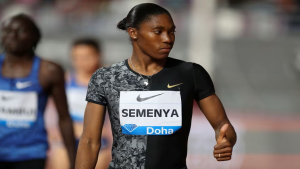South African athlete Caster Semenya will be back in the European Court of Human Rights in France today.
The court will consider whether the double Olympic champion, must lower her testosterone levels to compete.
The 33-year-old middle-distance athlete won an earlier round in the case last July. The court ruled that Semenya was a victim of discrimination from the Court of Arbitration for Sport in Lausanne.
Semenya has refused to take drugs to reduce her testosterone levels since track and field’s governing body World Athletics introduced its original rules in 2018.
Semenya, upon entering the global stage and becoming a world champion, has been subjected to questions related to this.
“For me, I will say, it was great but in another way round, it wasn’t because you know I get introduced to the world, I become a world champion and then my gender is questioned, it is not a problem but the problem was how IAAF dealt with the situation. And for me it was just nothing because at the end of the day, I knew who I was and I understood myself,” says Semenya.
Caster Semenya wins testosterone discrimination case in European Court:
The IAAF, in April of 2018, introduced new eligibility regulations for female classifications for Athletes with DSD for restricted events which includes the 800m race which Semenya had won multiple times.
The IAAF, in its explanation behind what informed this new requirement, noted, among other things that “evidence shows clearly that, at least in certain events, DSD athletes with levels of circulating testosterone in the normal male range, have a very significant competitive advantage over female athletes with testosterone levels in the normal female range”.
While Semenya won her discrimination case which found that these regulations had little regard for international human rights and that her appeal to the Swiss Federal Court had not been properly heard, it was a technical one as athletes such as her and many others are still prevented from competing.
The South African Human Rights Commission’s Andre Gaum, at the time of Semenya’s successful discrimination case, said that it was time for the body to accept the European Court of Human Rights judgment.
“I think the appropriate thing for world athletics now is to accept this judgment and to accept that here is a finding that it discriminated by means of these regulations, against not only Caster Semenya, but people in a similar position and they should continue to amend these regulations.
I really do think this is a serious finding, they should rethink their position and amend their regulations so it is in line with human rights.”
The Swiss government’s referral is expected to be heard by 17 judges including the Court’s President, Vice-Presidents, the Section Presidents and the national judge. – additional reporting by Canny Maphanga





